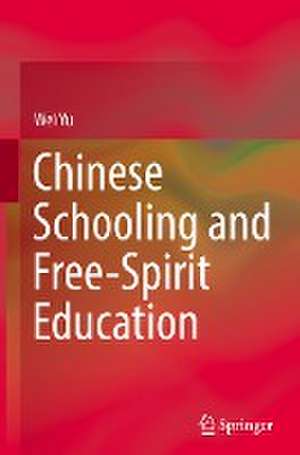Chinese Schooling and Free-Spirit Education
Autor Wei Yuen Limba Engleză Hardback – 7 aug 2023
Preț: 780.82 lei
Preț vechi: 952.22 lei
-18% Nou
Puncte Express: 1171
Preț estimativ în valută:
149.43€ • 162.26$ • 125.52£
149.43€ • 162.26$ • 125.52£
Carte tipărită la comandă
Livrare economică 23 aprilie-07 mai
Preluare comenzi: 021 569.72.76
Specificații
ISBN-13: 9789819943494
ISBN-10: 9819943493
Pagini: 152
Ilustrații: IX, 152 p. 20 illus., 17 illus. in color.
Dimensiuni: 155 x 235 mm
Greutate: 0.41 kg
Ediția:1st ed. 2023
Editura: Springer Nature Singapore
Colecția Springer
Locul publicării:Singapore, Singapore
ISBN-10: 9819943493
Pagini: 152
Ilustrații: IX, 152 p. 20 illus., 17 illus. in color.
Dimensiuni: 155 x 235 mm
Greutate: 0.41 kg
Ediția:1st ed. 2023
Editura: Springer Nature Singapore
Colecția Springer
Locul publicării:Singapore, Singapore
Cuprins
Chapter 1: Modernity, localization and free-spirit education: Our paths
Chapter 2: Free-spirit education: background and history
Chapter 3: Free-spirit education: what it means
Chapter 4: Free-spirit education in classroom: Process-based inductive teaching
Chapter 5: Cases from the field
Chapter 6: Ten books for free-spirit education
Chapter 2: Free-spirit education: background and history
Chapter 3: Free-spirit education: what it means
Chapter 4: Free-spirit education in classroom: Process-based inductive teaching
Chapter 5: Cases from the field
Chapter 6: Ten books for free-spirit education
Notă biografică
Dr. Yu Wei is Professor of the Faculty of Education, Northeast Normal University, Changchun, China. He is also Principal of three elementary schools in Changchun. He was awarded Changjiang Distinguished Professor by Ministry of Education, China. He serves as Deputy Director of the Pedagogy Branch in the Chinese Society of Education and Vice Director of the Philosophy of Education Society of China. He is also Member of the National Textbook Committee and the National Academic Committee of Educational Theory.
His research interests include philosophy of education, children philosophy, and school education innovation.
His research interests include philosophy of education, children philosophy, and school education innovation.
Textul de pe ultima copertă
Reaching deep into the wealth of Chinese philosophical wisdom, this book offers rich insights into a way of educating that has found staunch advocates among educators through the ages. The ‘free-spirit education’, which calls on educators to respect and nurture the natural goodness of each child, affords an educational principle that is embedded in one of the most important Confucian classics: The Doctrine of the Mean. This book analyzes the meaning, history, principles, and educational application of ‘free-spirit education’ and also explores its contemporary development in the context of a school improvement initiative. It introduces the intellectual origins of ‘free-spirit education’, the application in ’process-based inductive teaching’ and cases from the field. It presents the collection of pedagogical cases that are rooted in the traditions of Chinese philosophic inquiry and viewed through the lens of contemporary pedagogy for human development. This book is a useful reference for university faculty, educational researchers, school teachers and leaders, graduate and undergraduate students in curriculum studies and in philosophy, social science, and education, curriculum developers, and all those educators who are interested in understanding ‘free-spirit education’—a key component of the humanistic traditions of Chinese education.
Caracteristici
Provides the understanding of curriculum innovation in China
Offers a case study of educational change through the lens of an educator’s reflection and practice
Examines a scholar-practitioner to navigate the terrains of change in a highly structured institutional environment
Offers a case study of educational change through the lens of an educator’s reflection and practice
Examines a scholar-practitioner to navigate the terrains of change in a highly structured institutional environment
